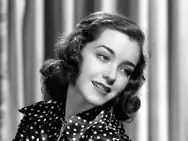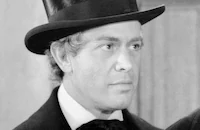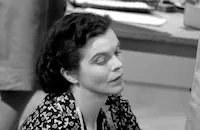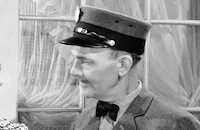Joe Smith, American

Brief Synopsis
Cast & Crew
Richard Thorpe
Robert Young
Marsha Hunt
Harvey Stephens
Darryl Hickman
Jonathan Hale
Film Details
Technical Specs

Synopsis
Joe Smith, a "buck an hour" crew chief on the assembly line at a Los Angeles defense plant, is an ordinary guy, who loves his wife Mary and fourth-grade son Johnny, and manages to pay his $28.80 monthly mortgage on time. After he and others on the line are questioned about their personal lives by their boss, Blake McKettrick, and two men from Washington, Freddie Dunhill and Gus, Joe is summoned by plant president Mr. Edgerton. Joe is asked to quickly draw details of a blue print, after seeing it very briefly. When he successfully does so, Edgerton, Freddie and Gus reveal that they want him to work on a top secret bomb sight with a raise in pay, but no one can know what he is doing, not even Mary. At home, Mary tells Joe that Johnny has spent his 25 cent allowance in one day and refuses to say why. Joe cannot find out the reason either. Even when Joe threatens to send Johnny to bed with no supper, Johnny firmly states that he has to keep his secret. That night, Mary relents and gives Johnny something to eat. When Joe does the same, he finds what the tender-hearted Mary has done and realizes how lucky he is. On the drive to school the next day, Johnny tells Joe he likes history and admires patriot Nathan Hale for saying "I regret that I have but one life to give for my country." As Joe drives away from the plant that evening, he realizes that he is being followed, but cannot shake the car, which forces him off the road. Four men then take Joe, who is soon tied up and blindfolded in a darkened room. The men demand information on the bomb sight, but Joe refuses. As they beat him, Joe tries to think of other, happier things, including his courtship of Mary and Johnny's birth. Meanwhile, at a bowling alley, Joe's friends, Eddie, Sammy and Roy, are concerned that Joe has not shown up and decide to go to his house. Mary is worried, as is Johnny, who thinks that his "secret" has made Joe stay away. When Roy, Eddie and Sammy arrive, they tell Mary about Joe's very secret promotion. In the darkened room, the torture is finally too much for Joe, who screams out that he will tell them everything. When they give him a pad of paper, though, it is decorated with a flag and the slogan "E pluribus unum," just like Johnny's at school, and Joe begins to think. When he asks for a pencil, he notices a snakeshead ring on one of the men's fingers, then refuses to draw the plans. They then give him sixty seconds to recant or be killed. While the seconds tick away, Joe thinks of Nathan Hale's sacrifice. When Joe again refuses, the men knock him onto the floor, and Joe determines to use all of his senses to help capture them, if he escapes. Joe is then taken from the room and driven away. As he goes, Joe memorizes everything, from the number of steps to the twists and turns of the road. Finally, when the car slows for a stop sign, Joe leaps out and the men cannot go back for him because the street is crowded. Fearing that he will forget everything, Joe writes the directions down in code on the sidewalk, then passes out. He is soon found by the police, and awakens in the hospital. Mary, Freddie and Gus are there and want him to rest, but Joe insists on retracing his car ride before he forgets. Following Joe's directions, they soon find the house in which Joe was held captive. After bursting in, they are able to arrest the men because of things Joe remembers about their voices, shoes and cigarettes, but the man with the snakeshead ring is not there. At home, Gus, Freddie, Edgerton and McKettrick congratulate Joe, and when McKettrick shakes his hand, Joe recognizes his distinctive ring. McKettrick is then quickly apprehended as he tries to escape. One month later, on Father's Day, Mary and Joe have a party with their friends and Johnny gives Joe his gift, a tie, revealing what his secret was. When his friends call Joe a hero, he scoffs, saying that there are no heroes in America, just people "who don't like being pushed around."

Director

Richard Thorpe
Cast

Robert Young

Marsha Hunt

Harvey Stephens

Darryl Hickman

Jonathan Hale
Noel Madison

Don Costello
Joseph Anthony
William Forrest

Russell Hicks
Mark Daniels
William Tannen
James Seay
Maynard Holmes
Kitty O'neil
Gladden James
Frances Morris
Dick Wessel

James Millican

John Gallaudet
Robert Kellard
Cliff Danielson
Connie Russell
Frances Raeburn
Robert Homans
Frank Faylen

Dorothy Adams
Paul Kruger

Lee Phelps
Phillip Morris
Selmer Jackson
George Carleton
Mitchell Ingraham
Cliff Clark

John Butler
Billy Bletcher
Eddie Hart
Al Trescony
Hubert Brill
Edgar Sherrod
Warren Mccollum
Ernie Alexander
John Raitt
Eddie Parker
Helen Dickson
Richard Kipling
Crew
Joe Boyle
Jack Chertok
Jack Dawn
Cedric Gibbons
Paul Groesse
Charles Lawton
Harry Rapf
Allen Rivkin
Douglas Shearer
Art Smith
Elmo Veron
Edwin B. Willis

Film Details
Technical Specs

Articles
Joe Smith, American
The story follows the ordeal, and eventual triumph, of an ordinary-Joe factory worker entrusted with top-secret plans for a new bombsight (a device used by aircraft to accurately hit targets). Kidnapped by enemy agents, he is able to endure brutal torture by keeping in his mind the memories of all the happiest moments of his life. The flashback structure hooked the audience into the pride and joy of an all-American life worth fighting for and illustrated that anyone, even the most commonplace person on the homefront, could be a hero.
The story shared elements with the Alfred Hitchcock thriller Saboteur (1942) released a few months later, which featured Robert Cummings as an ordinary factory worker pursued by Nazi agents. Both called to mind actual espionage cases of the time. Hitchcock's film even used stock footage of the ocean liner SS Normandie, which had caught fire and capsized in New York harbor in February 1942. The fire was, in fact, the result of a welding accident not, as rumored initially, sabotage, but Hitchcock inserted the footage to imply the ship's destruction was the work of his film's villain. Although not directly referred to in Joe Smith, American, the public was well aware of the case of Herman Lang, a German spy who was convicted in 1941 of giving secret plans for the advanced Norden bombsight to the Nazis in 1938. In Joe Smith, American, however, the secret remains safe, thanks to Joe's fortitude and faith and his ability to escape and lead authorities back to the enemy.
For their average guy, the producers cast reliable second-string star Robert Young, who would extend his comforting, trustworthy persona into a successful television career beginning in the 1950s as the dad on the long-running sitcom Father Knows Best and later as the down-to-earth family doctor Marcus Welby, M.D. Young made his film debut in 1928. He signed with MGM in 1931 and for the next 14 years was an all-purpose leading man, supporting many of the studios' top female stars in major productions and playing leads mostly in B pictures.
His wife Mary is played by Marsha Hunt, who had just received good notices for her role as a suicidal young woman in the Greer Garson vehicle Blossoms in the Dust (1941). Hunt was also a frequently used contract player with several notable supporting roles to her credit but never in the top rank of stars. Her future career was not as successful as Young's, due largely to the Hollywood blacklist that tainted her and then husband Robert Presnell, Jr. with communist sympathies. Hunt appeared in a number of television series episodes beginning in the late 1950s, and guest starred once on Young's medical show. Around the same time, she had one of her more notable later roles, as the mother in fellow blacklistee Dalton Trumbo's anti-war film Johnny Got His Gun (1971).
B pictures proved to a good training ground for future stars. Both Ava Gardner and John Raitt (later known for Broadway musicals and as the father of musician Bonnie Raitt) are listed in the cast by many sources, although they receive no screen credit and are likely to be missed by anything less than an eagle eye. Child star and future actor Robert Blake appears in a flashback as the young Joe Smith.
These programmers were also good opportunities for the people behind the camera. Writer Paul Gallico, whose story in Cosmopolitan magazine was the source material for the screenplay, was Oscar®-nominated this same year for the original story of the Lou Gehrig biography The Pride of the Yankees (1942). Director Richard Thorpe didn't need Joe Smith, American to help his career; he had already made more than 130 movies since 1923. Although he later helmed a few big-budget productions, such as Ivanhoe (1952), and worked on lesser releases of major stars like Joan Crawford, Gary Cooper, and Elvis Presley, B movies were his bread and butter, along with sequels in several hit series, among them Tarzan and the Thin Man franchises. Thorpe has never been rated very high among filmmakers, but he is recognized as one of the most prolific directors of all time with more than 180 films to his credit, close to 70 of them in his 30-year association with MGM.
Joe Smith, American was remade in 1959 as The Big Operator, with Steve Cochran and Mamie Van Doren as the "average" couple and Mickey Rooney as the sadistic gangland boss who tortures the hero, the emphasis shifting from war espionage to labor racketeering. The characters of Joe and Mary, and their son Johnny - or the character names, at any rate - turned up later as the all-American family hearing God over the airwaves in The Next Voice You Hear... (1950), produced by Dore Schary in his third go-round at the studio, this time as head of production.
Director: Richard Thorpe
Producers: Jack Chertok; Dore Schary and Harry Rapf (uncredited)
Screenplay: Allen Rivkin, based on the story "The Adventures of Joe Smith, American" by Paul Gallico
Cinematography: Charles Lawton
Editing: Elmo Veron
Art Direction: Cedric Gibbons
Original Music: Daniele Amfitheatrof
Cast: Robert Young (Joe Smith), Marsha Hunt (Mary Smith), Harvey Stephens (Freddie Dunhill), Darryl Hickman (Johnny Smith), Jonathan Hale (Blake McKettrick).
BW-63m.
by Rob Nixon

Joe Smith, American
Quotes
Trivia
Ava Gardner is listed in some modern sources as an actress in this movie, but she is not identifiable.
The movie was one of ten selected by the East and West Association to be sent to asian countries as "most representative" of American life.
Notes
The opening credits contained the following written prologue: "This story is about a man who defended his country. His name is Joe Smith. He is an American. This picture is a tribute to all Joe Smiths." Hollywood Reporter news items contribute the following information about the production: For several months prior to the start of production, Dore Schary was set to direct the picture based on "his own yarn" (which May have meant that he was also set to write the screenplay). Schary was also said to have been given cooperation by Lowell Mellett, head of public relations for the U.S. government's "defense branch." The extent of Mellet's contribution to the released film has not been determined. Van Heflin was at one time set to star in the title role. Some shooting took place at two different locations in the Montebello oil district in Southern California and, according to an M-G-M press release, the bowling alley sequence was shot at the Culver City Bowling Alley, close to the M-G-M lot in Culver City.
Although some modern sources indicate that actress Ava Gardner made her motion picture debut in the film, she was not identifiable in the viewed print. Other modern sources indicate that she made her debut in the 1941 film H. M. Pulham, Esq., which was filmed just prior to Joe Smith, American. New York Times film critic Bowsley Crowther gave the film an "honorable mention" to his "Ten Best Films of the Year" list, and several consumer magazines praised the low-budget film for its excellence. According to an article in Hollywood Reporter on October 27, 1942, Joe Smith, American was one of ten films selected by the East and West Association to be sent for exhibition in Asian countries as "most nearly representative of life in the U.S." The 1959 M-G-M release The Big Operator, directed by Charles Haas and starring Mickey Rooney and Steve Cochran, was based on the same Paul Gallico short story, but that film was centered on racketeering and trade unions and updated to a late 1950s setting.















